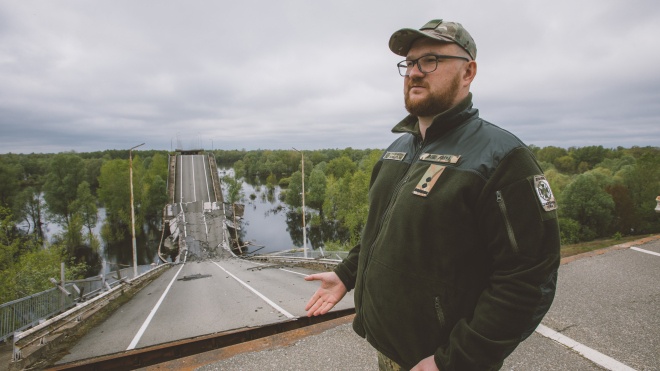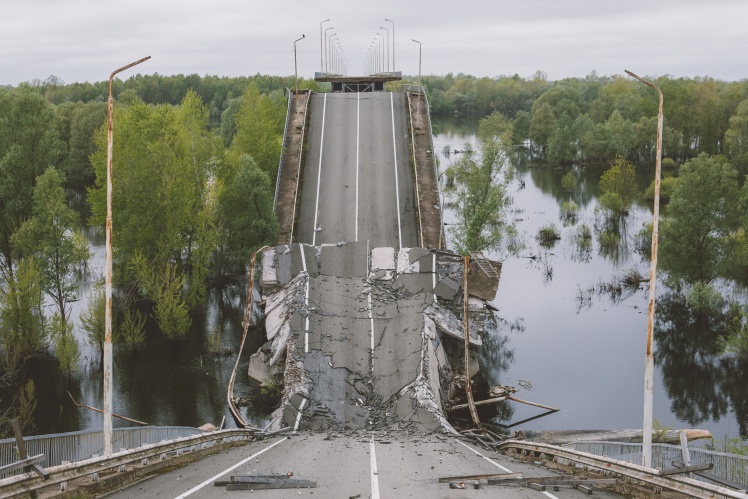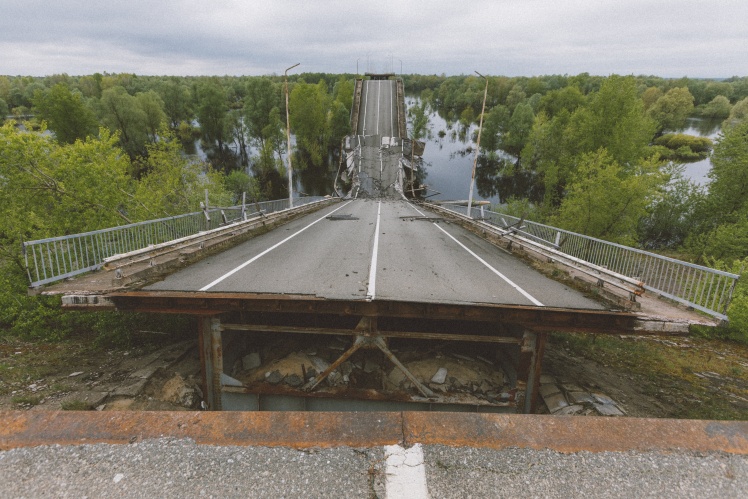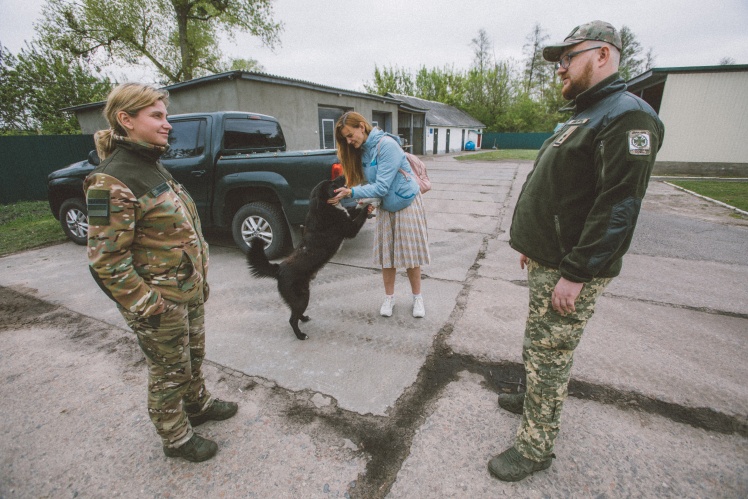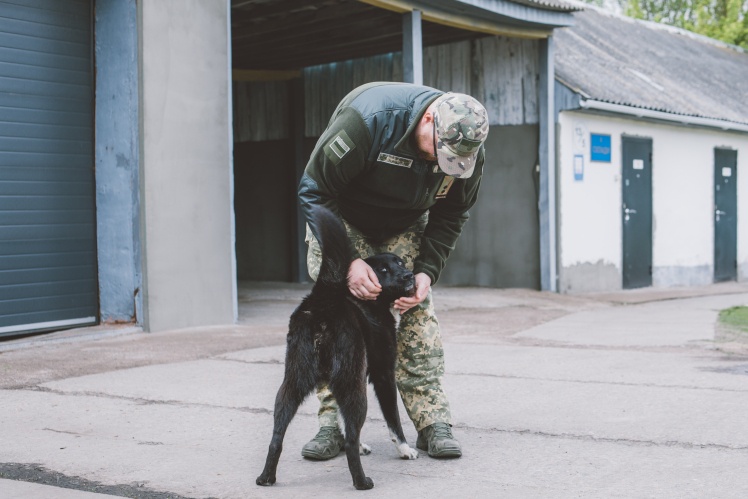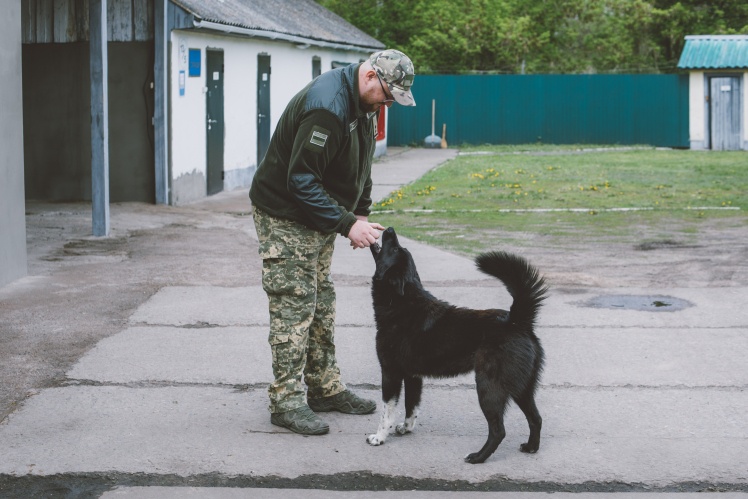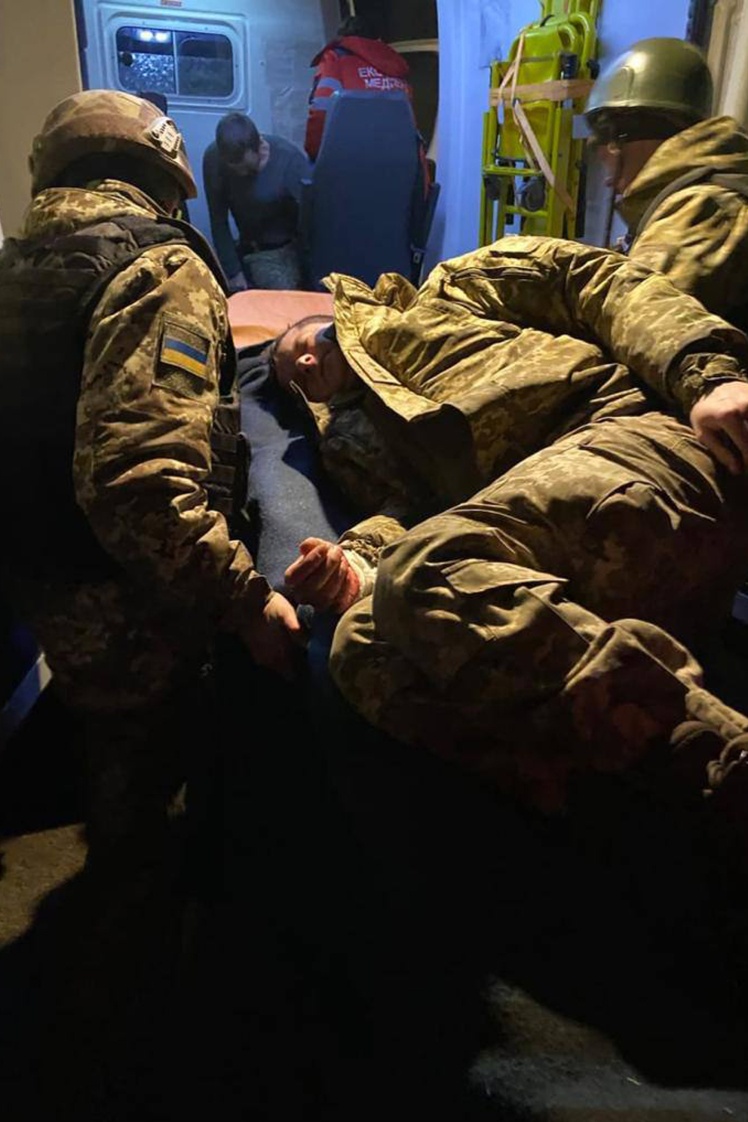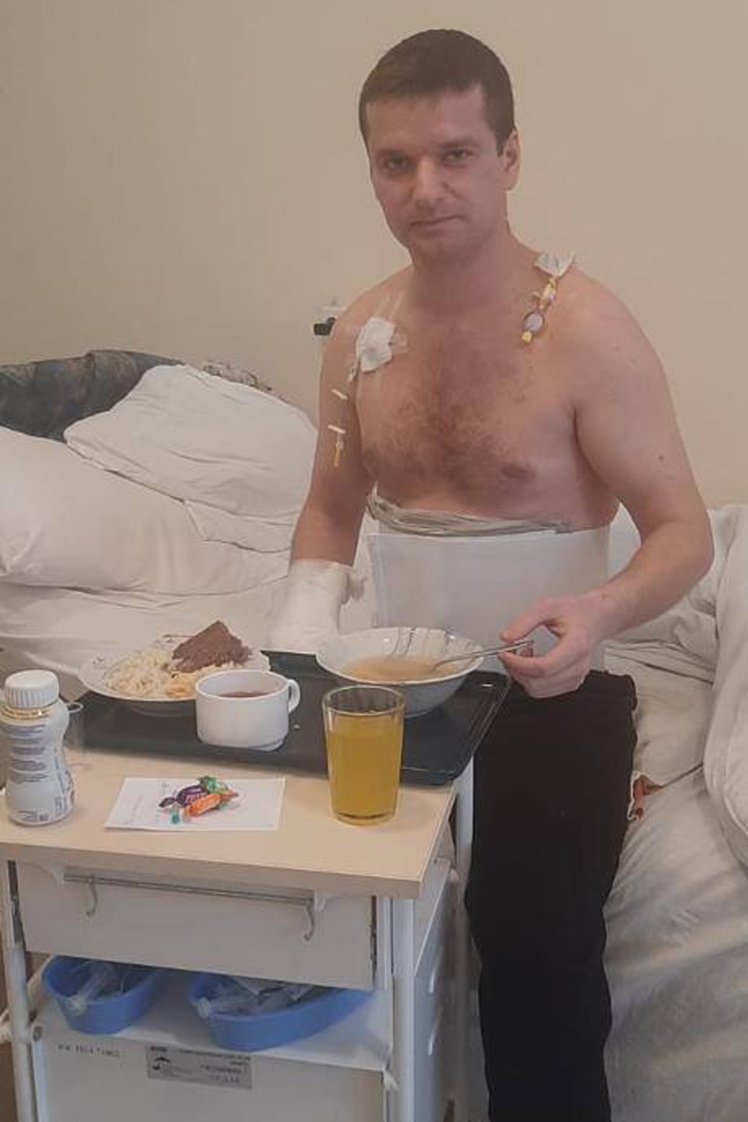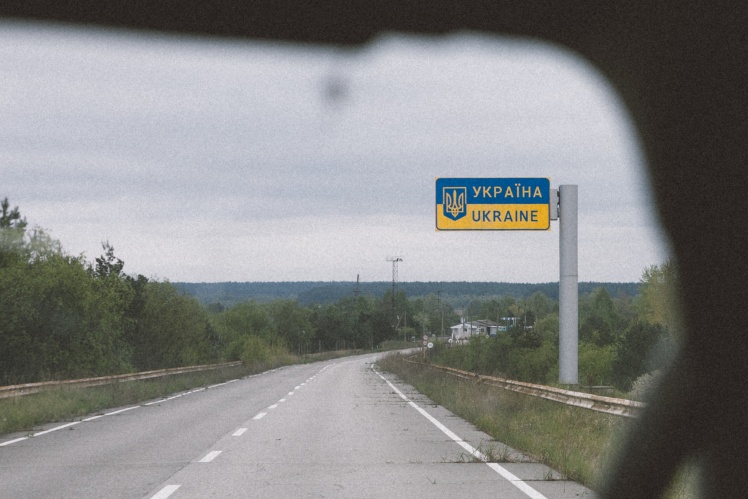1.
There are many military personnel at the Chernihiv railway station checking the documents of the men who got off the Kyiv train. We are late for the border guards who are waiting on the street. We get out, and Ihor Shylo, tall, broad-shouldered, is standing next to the car. He is 36 years old, for 19 years has served as a border guard. He went to study at the National Academy of the State Border Service in Khmelnytskyi after school, at the age of 16, following his older sister Iryna. After the academy, he worked on the border in Zakarpattia, Volyn and Sumy regions. He comes from Chernihiv, where his wife Maryna lives with their eight-year-old son Ivan. In 2021, he was transferred to work in his hometown — appointed as the first deputy head of the Dniprovske border service department in the Chernihiv region.
Border guard Ihor Shylo.
Alex Kuzmin / «Babel’»
"Letʼs go to the destroyed bridges, and weʼll talk there," he says in such a way that there is no chance to deny it.
- Far to go? — I clarify.
- An hour. I will show you the positions on the way, — he answers.
Chernihiv is full of flowers — trees and tulips are blooming. The bombed-out high-rises are not visible.
- Many houses were repaired. Now, look across the road, — points out Ihor. — A year ago, a high-rise building burned down — an air force arrived. Now itʼs like a new one.
Immediately after Chernihiv, Ihor asks to look on one side of the road, then on the other. He points to the intersection and says that the Russians approached the city from it and took it in a ring. They had no other way because the border guards blew up the bridges from Belarus.
In the forest, the road narrows — in a matter of minutes, there is the border. The checkpoint is closed. The windows are covered with sandbags.
The bridge that used to lead to Belarus across the river has collapsed in half. Ihor nods towards the border. In front of us is a cliff and crumpled pieces of road that hang down to the water. But on the Belarusian side, the city is intact.
"A few days before the invasion, it was mined, and on February 24, the part of the bridge that belongs to Ukraine was blown up," Shylo explains.
The automobile bridge at the "Slavutych" checkpoint, which, until February 24, led from Ukraine to Belarus. On February 24, border guards and the military blew up his 700 kg of TNT.
Alex Kuzmin / «Babel’»
2.
In the Chernihiv region, the border with Belarus is 232 km long, of which 90 km is on land and 140 km is on water, along the Dnipro and Sozh rivers. The Shila department is responsible for the water border on the Dnipro — it is 64 km, as well as for the "Slavutych" road checkpoint and the "Nedanchychi" railway checkpoint. Until February 24, they connected Ukraine and Belarus with bridges.
In the Chernihiv region, there were only two bridges between Ukraine and Belarus across rivers.
Alex Kuzmin / «Babel’»
When Shylo was transferred to the Dniprovske border department half a year before the full-scale invasion, he understood that there would be heavy battles for the bridges if the war started. Because of them, the fastest way to get from Belarus to Chernihiv is two hours by road; besides, they are big. The automobile one would withstand convoys of tanks and Grads, and the railway one would be used to transport fuel, ammunition, and troops.
Before that, Ihor did not guard the water border. He says that it only seems easy at first — a wide river that can only be crossed by boat. No illegal migrants, no cigarette and fuel smugglers on land.
— Throughout 2021, the premonition of the great war did not leave, although I did not want to believe in it until the end, — recalls Shylo. — While the Russians were conducting fake training in Belarus, we were expecting provocations from them.
Ihor recalls that before the beginning of the great war, many fishermen always went to the Dnipro. Up to a hundred boats a day — both Ukrainian and Belarusian. In the year before the full-scale invasion, they were closely watched. Subversive and reconnaissance groups of Russians could disguise themselves as fishermen, collect information, or even enter Ukraine.
- We were ambushed for two days. With binoculars, walkie-talkies, and weapons, says Shylo. — Although there were no provocations by the Russians and Belarusians the year before last.
Then, there was only one extraordinary event at the border. Several Ukrainian fishermen got lost, and the Belarusians detained them for three days. The boat was confiscated and handed over to the Ukrainians.
What happened in Ukraine a week before the invasion
-
Unity Day was celebrated in Ukraine for the first time after President Volodymyr Zelenskyy signed the decree "On urgent measures to consolidate Ukrainian society". Western media announced Russiaʼs attack on this day. In his speech, Zelensky said: "We are told that February 16 will be the day of the attack. We will make it a day of unity."
-
The "LPR" shelled Stanytsia Luhansk and the village of Vrubivka from "Grads". Kindergarten and school were hit.
-
The "LPR" shelled the city of Shchastya with "Grads". A humanitarian aid column, a school, and the Luhansk TPP were destroyed. Evacuation to Russia began in the occupied territories.
-
The LPR started the forced mobilization of men.
-
Putin recognized the independence of certain regions of the Donetsk and Luhansk regions occupied by the "LPR" and "DPR" groups, and declared that he would introduce regular Russian troops into these territories.
-
The Verkhovna Rada voted to introduce a state of emergency in Ukraine from 00:00 on February 24.
Before the full-scale invasion, Belarusian and Ukrainian border guards communicated on an official level — exchanging information on how many cars and people crossed the checkpoint. The data were reconciled so that there were no people who left one country and did not reach the other.
— In 2021, we hardly spoke with them. We understood that the enemy was moving freely through their territory. If even the Belarusians do not attack, then the Russians will attack from their country, says Shylo.
A week before the invasion, the roar of military equipment could be heard constantly from the Belarusian side — the Russians did not drive along the bank because it is swampy, but somewhere further away. There was a lot of equipment; the sound could be heard across the Dnipro five kilometers away.
Even on February 23, cars calmly crossed the bridge from both the Ukrainian and Belarusian sides. People usually pass through here in the morning and afternoon, so it is still unknown whether the Belarusians closed their border on the night of the attack, as the Russians did in the Luhansk region.
- I did not expect anything good from the Belarusians because they are on the same foot as our enemy, although on the night of the invasion, they could easily pick up the phone and say: "Drones are flying at you. Get ready," says Shylo.
3.
Before the Great War, the border unit "Dniprovske" was located in the village of the same name. Then and now, no more than 400 people live here. Village houses are opposite the outpost. Dogs are running on the street. Among them is one dog named Klishch. For the past few months, he has been running here together with the border guards who visit the village. After the attack on the pawnshop on February 24, it was moved to another place.
Klishch got to the border guards recently. Ihor named the dog Klishch because he does not allow people to remove mites from his body.
Alex Kuzmin / «Babel’»
Once the border guards went to check one of the local tourist bases, the guards there said that they had nothing to feed the dog, so they would shoot him. The dog heard this, and when the border guards left, he ran after them. The men spotted Klishch only twenty kilometers away. He was so exhausted that he could not jump into the car. He was carried into the salon in his arms. Since then, he has been guarding the border.
When Ihor gets out of the car, the dog runs to him. It was Shylo who called him Klishch — the dog has long hair, collects parasites, and it does not let then be removed.
- There were two tents here, — Ihor runs his hands around the lawn.
The tents were pitched a week before the invasion, and additional border guards were placed in them to reinforce the security. Now, there is green grass and a burnt tree in this place. It burned when a Russian drone with explosives crashed into it.
One of the tents on which the Russians dropped bombs by drones on February 24.
«Babel'»
Ihor says that on the night of February 24, reinforced units came out to guard the road and railway bridges on the border. A few days before that, the bridges were mined, and the number of people on duty increased.
At approximately 04:15 in the morning, the border guards, who were in ambush near the road bridge, heard a buzzing sound overhead. Something swept over them and disappeared. The fact that these are drones with bombs was understood in a few minutes. Three kilometers away, two explosions rang out where the outpost was.
The drones were flying so fast that the people on duty near the bridge did not have time to warn anyone. When they called the unit, they heard on the phone: "We were attacked, explosions. There are wounded, there are dead."
The first drone caught a tree and exploded in the branches. Shrapnel from the bomb cut through the fence, windows, and walls of the outpost building. A second drone carrying a bomb exploded in mid-air over a tent where three men were sleeping. 31-year-old Viktor Derevyanko suffered the most. A metal fragment of the explosive passed through his arm at the wrist, entered his stomach, and stopped near his heart. Viktor was sleeping at that moment and woke up from the first explosion. He wanted to get up, but he couldnʼt because he didnʼt understand what was happening. He only felt that he was picked up in arms and carried to the department. There were six more border guards with him — people bandaged their hands, legs, and torsos. Viktor was asked not to lose consciousness, the wound on his stomach was bleeding.
The soldiers take Viktor Derevyanka to the ambulance — a fragment of the explosive passed through his arm at the wrist, entered his stomach and stopped near his heart. The border guard underwent several operations in Chernihiv and Kyiv.
«Babel'»
Shylo was not in the department — he was at home. When the person on duty called and said that the outpost had been attacked, he immediately understood who had done it. But at that moment, he had no idea that this was a full-scale invasion. He thought that the Russians were provoking the Ukrainian border guards to open fire first.
"Get some water and charge your phone," he said to his wife. — If itʼs a war, they will fire at the infrastructure.
When Ihor went outside, he realized that the outskirts of the city were being bombed. It was five in the morning — Putin declared war.
He arrived at the border department and saw ambulances taking away the wounded and residents of the village. Some of them ran to help after the explosions, others asked what they should do. There were also those who asked to be mobilized.
Border guards were ordered to hold combat positions until the end. They loaded the weapons that were in the department — submachine guns and RPGs — into the car and prepared for battle. However, they understood that it would not be possible to stop the convoys of military equipment with grenade launchers.
- I got a call from "Three Sisters"; — they said that a convoy of tanks had entered. They are moving towards Chernihiv. Bridges had to be blown up.
The border guards destroyed both bridges around 12 oʼclock in the afternoon at one point, each of them was replaced with 700 kilograms of TNT. Then, they were ordered to retreat to Chernihiv and unite with the Defense Forces to defend the city.
«Babel'»
- If we had stayed in the department, we would have died. We would have ended up in occupation, but none of us was going to surrender, — says Ihor. — Residents of Ukrainian and Belarusian villages communicate, here everyone is related to each other. Maybe someone asked to take a picture near the border guards, and the person did not understand that he was being used.
4.
The battles for Chernihiv lasted until April 2. Shylo and the border guards held positions near the village of Novy Bilous, which is a suburb. Russian positions were a few meters away from them. If the Ukrainians had not maintained their defense, the Russians would have entered the city in ten minutes.
The border guard says that he never doubted that the city would survive. The only question was how long the siege would last. He mentions that since March 25, Russian planes have stopped circling over Chernihiv and bombing the city. Artillery and missile fire also decreased. People from the occupied villages said that the Russians were retreating.
- In those days, there was a feeling of euphoria. And then, on April 1, we learned the news about the atrocities in Bucha. I thought about how many women and children were saved because Chernihiv was not allowed to be occupied. And immediately, I was struck by the horror of the fact that the village where our unit is located and the entire territory close to Chernihiv had been under occupation for a month.
The road to the Ukrainian-Belarusian border There are still posters in the forest in Russian that were put up before the full-scale invasion.
Alex Kuzmin / «Babel’»
The defense of Chernihiv officially ended on April 4. On the same day, the state border with Belarus was taken under control. Shylo went to his outpost in Dniprovske in a small group. On the way, he stopped by the head of Mykhailo-Kotsyubynske village to ask if people were tortured there. Here stood the Roshvardya and the "Buryats". The head of the village said that the occupiers only intimidated the local population and settled in empty houses. During the occupation, they killed a man who was passing on information to the Ukrainian military about the location of Russian equipment, and the Russian Guardsmen found a photo in his phone.
The Russians stood in the village of Dniprovske for only a day. They ransacked the outpost — broke down the door, stole clothes and the entire supply of birch sap.
Shylo thinks that there were no mass tortures in the villages from Chernihiv to his department because few people live there.
— This territory was simply cut off from Chernihiv by Russian troops, there was no such occupation as in the Kyiv region, when Russians freely roamed the streets, abducting and torturing people, — says Shilo.
The only city in this district is Slavutych with 25,000 inhabitants.
If the Russian columns had crossed the Dnipro River, they would have captured Slavutych on the first day — the railway bridge is ten minutes from the city, and the road bridge — thirty. And so it happened only on March 27, and on April 3, the Armed Forces liberated the city.
Because of the blown bridges, the Russians were able to surround Chernihiv from three sides only on the fourth day of the full-scale invasion. The occupying columns could not cross the river and entered Ukraine by land from the territory of Belarus and Russia, then went deep into the region.
On March 30, 2022, Shylo was appointed head of the border division. Colleagues say that on the most challenging days, he kept calm and acted balanced. Ihor, when he hears such reviews about himself, is embarrassed. He answers that he actually gets angry sometimes, and there are moments when everything boils inside him, but he tries never to spill his emotions on people.
It happens every day near the road bridge that the border guards blew up on February 24. Approaches the edge and looks in the direction of Belarus.
Ihor is not interested in why the Russians did not march across the bridge in columns on the morning of February 24. He says that perhaps they were afraid that they would be covered by anti-aircraft guns here. They wanted to wait until the Russian troops, which entered by land, destroyed the Armed Forces. Now, if the Russians dare to go here, they will be able to do it only by water — but they have no chance of getting to our shores.
Belarusians sometimes go out on the bridge and look towards Ukraine. Ihor watches them silently at such moments.
Alex Kuzmin / «Babel’»
How a full-scale invasion began:
- On February 24, at 3:35 am, the Russians invaded the village of Zorynivka in the Luhansk region — this is how a full-scale war began. “Babel” spoke with a border guard who met the invaders with weapons
- Russia planned to take Kyiv in 3 days, soldiers killed hundreds of civilians, destroyed towns and villages. This is how the Russians captured the north of the Oblast: the chronicled testimony of defenders and residents
No matter how many bombs and missiles the Russians drop on Ukraine, they will never win. Because each of us supports the Armed Forces of Ukraine with a donation.
